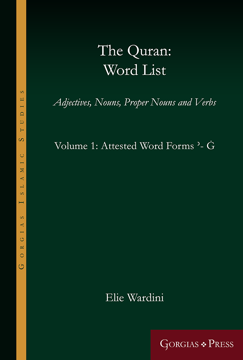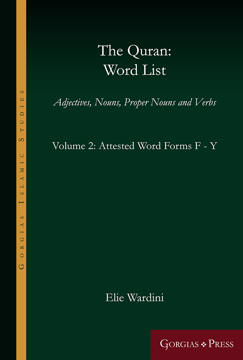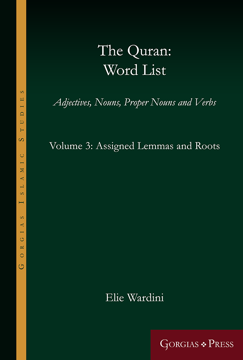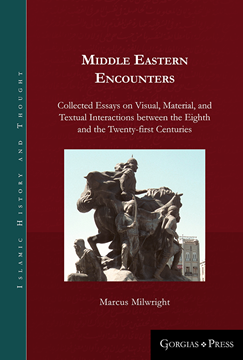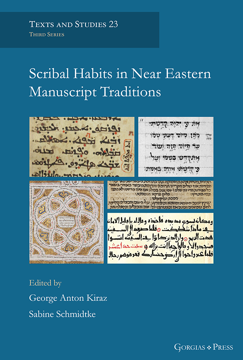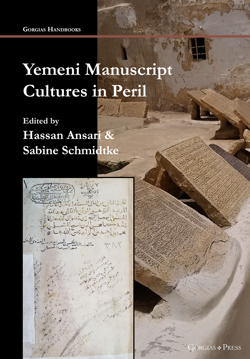Word List (Volume 1)
Adjectives, Nouns, Proper Nouns and Verbs
By Elie Wardini
Series:
Gorgias Islamic Studies 14
ISBN:
978-1-4632-4173-5
The aim with the present series, The Quran: Word List, is to present every word form in the Quran as raw data with as little interpretation as possible. The digital text used for this purpose is the Uthmani text of the Tanzil Quran Text. In volumes one and two each attested word form in the Quran is listed alphabetically with no parsing and no alteration. These are listed by word form < lemma < root. Volume three consists of two sections. In section one, the lemmas assigned to each attested word form are listed. In section two, the assigned roots are listed. In assigning each word a root and lemma, Classical dictionaries and Quran commentaries, as well as modern Quran dictionaries have been consulted.
$149.00 (USD)
Word List (Volume 2)
Adjectives, Nouns, Proper Nouns and Verbs
By Elie Wardini
Series:
Gorgias Islamic Studies 14
ISBN:
978-1-4632-4175-9
The aim with the present series, The Quran: Word List, is to present every word form in the Quran as raw data with as little interpretation as possible. The digital text used for this purpose is the Uthmani text of the Tanzil Quran Text. In volumes one and two each attested word form in the Quran is listed alphabetically with no parsing and no alteration. These are listed by word form < lemma < root. Volume three consists of two sections. In section one, the lemmas assigned to each attested word form are listed. In section two, the assigned roots are listed. In assigning each word a root and lemma, Classical dictionaries and Quran commentaries, as well as modern Quran dictionaries have been consulted.
$149.00 (USD)
Word List (Volume 3)
Adjectives, Nouns, Proper Nouns and Verbs
By Elie Wardini
Series:
Gorgias Islamic Studies 14
ISBN:
978-1-4632-4177-3
The aim with the present series, The Quran: Word List, is to present every word form in the Quran as raw data with as little interpretation as possible. The digital text used for this purpose is the Uthmani text of the Tanzil Quran Text. In volumes one and two each attested word form in the Quran is listed alphabetically with no parsing and no alteration. These are listed by word form < lemma < root. Volume three consists of two sections. In section one, the lemmas assigned to each attested word form are listed. In section two, the assigned roots are listed. In assigning each word a root and lemma, Classical dictionaries and Quran commentaries, as well as modern Quran dictionaries have been consulted.
$123.00 (USD)
The Quran. Word List. 3 vols. - Bundle
ISBN:
978-1-4632-4179-7
This collection brings together the three volumes of Elie Wardini's The Quran: Word List. The aim of these volumes is to present the Quran as raw data with as little interpretation as possible. The digital text used for this purpose is the Uthmani text of the Tanzil Quran Text. In volumes one and two each attested word form in the Quran is listed alphabetically with no parsing and no alteration. These are listed by word form < lemma < root. Volume three consists of two sections. In section one, the lemmas assigned to each attested word form are listed. In section two, the assigned roots are listed. In assigning each word a root and lemma, Classical dictionaries and Quran commentaries, as well as modern Quran dictionaries have been consulted.
*Please note, no additional discounts apply to this bundle. The price quoted below is the lowest price.
$285.00 (USD)
Jacob of Sarug's Homilies on Jacob
On Jacob’s Revelation at Bethel and On our Lord and Jacob, on the Church and Rachel and on Leah and the Synagogue
Translated by Dana Miller; Edited with Notes and Introduction by Mary T. Hansbury
Series:
Texts from Christian Late Antiquity 58
ISBN:
978-1-4632-4189-6
Recognized as a saint by both Chalcedonian and non-Chalcedonian Christians alike, Jacob of Sarug (d. 521) produced many narrative poems that have rarely been translated into English. Of his reported 760 metrical homilies, only about half survive. Part of a series of fascicles containing the bilingual Syriac-English editions of Saint Jacob of Sarug’s homilies, this volume contains two of his homilies on Jacob. The Syriac text is fully vocalized, and the translation is annotated with a commentary and biblical references. The volume is one of the fascicles of Gorgias Press’s Complete Homilies of Saint Jacob of Sarug, which, when complete, will contain all of Jacob’s surviving sermons.
$38.00 (USD)
Middle Eastern Encounters
Collected Essays on Visual, Material, and Textual Interactions between the Eighth and the Twenty-first Centuries
Series:
Islamic History and Thought 21
ISBN:
978-1-4632-4193-3
This book focuses on interactions between the Islamic world and other regions from the late eighth to the twenty-first centuries. Some chapters consider the complex relationship between Islam and the cultures of Late Antiquity in the Middle East and Mediterranean basin. The reprinted chapters in this volume have been revised and updated. Topics include relief-moulded pottery production in Raqqa, the construction of palaces in Samarra, portraiture in Arabic manuscript painting, written descriptions of patterned marble in medieval Islam, images of Muslim rulers in early Modern printed books, and the broadcast of the medical examination of Saddam Hussein. Also included are a critical introduction that considers the challenges involved in the study of cultural interactions between Islamic and non-Islamic regions, a cumulative bibliography, and a previously unpublished study of recently discovered photographs, drawings, and writings relating to the Middle East made by soldiers during and after World War I.
$177.00 (USD)
Scribal Habits in Near Eastern Manuscript Traditions
Edited by George Anton Kiraz & Sabine Schmidtke
Series:
Texts and Studies (Third Series) 23
ISBN:
978-1-4632-4195-7
This volume brings together contributions by scholars focussing on peritextual elements as found in Middle Eastern manuscripts: dots and various other symbols that mark vowels, intonation, readings aids, and other textual markers; marginal notes and sigla that provide additional explanatory content akin to but substantially different from our modern notes and endnotes; images and illustrations that present additional material not found in the main text. These elements add additional layers to the main body of the text and are crucial for our understanding of the text’s transmission history as well as scribal habits.
$114.95 (USD)
A History of the Study of Grammar among the Syrians
An English translation of Historia artis grammaticae apud Syros
By Adalbert Merx; Translated by Daniel King
ISBN:
978-1-4632-4197-1
An English translation of a Latin work on the Syriac grammatical tradition ('Historia artis grammaticae apud Syros') by the 19th-century German theologian and linguist, Adalbert Merx.
$95.00 (USD)
$76.00 (USD)
Yemeni Manuscript Cultures in Peril
Edited by Hassan Ansari & Sabine Schmidtke; Contribution by Stefanie Brinkmann, Gabriele vom Bruck, Bernard Haykel, Brinkley Messick, Christoph Rauch, Anne Regourd, Valentina Sagaria Rossi, Karin Scheper, Jan Thiele, Daniel Martin Varisco, Arnoud Vrolijk & Zaid bin Ali al-Wazir
Series:
Gorgias Handbooks 49
ISBN:
978-1-4632-4202-2
The most significant and by far largest collections of Zaydi manuscripts are housed by the many public and private libraries of Yemen, an endangered cultural heritage tradition, currently at risk due to the conflict and warfare in Yemen. The contributions brought together in this volume address a wide spectrum of aspects concerning Yemeni manuscript cultures, with some focusing on their history and present state within Yemen and others discussing the collections of manuscripts of Yemeni provenance in Europe and elsewhere.
$48.00 (USD)
Kāṇḍa Fifteen
Text, translation, commentary
By Duccio Lelli
Series:
Harvard Oriental Series - Opera Minora 13
ISBN:
978-1-4632-4204-6
Since its discovery and the initial efforts toward its critical edition, the Paippalādasaṃhitā of the Atharvaveda (PS) has attracted the attention of Vedic scholars and Indologists for several reasons. It constitutes a precious source for the study of the development of the earliest language. The text contains important information about various rites and magical practices, and hints about the oldest Indo-Iranian and Indo-European myths. All of this makes the PS a text of inestimable value for the study of Indian language and culture.
$139.00 (USD)
